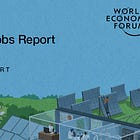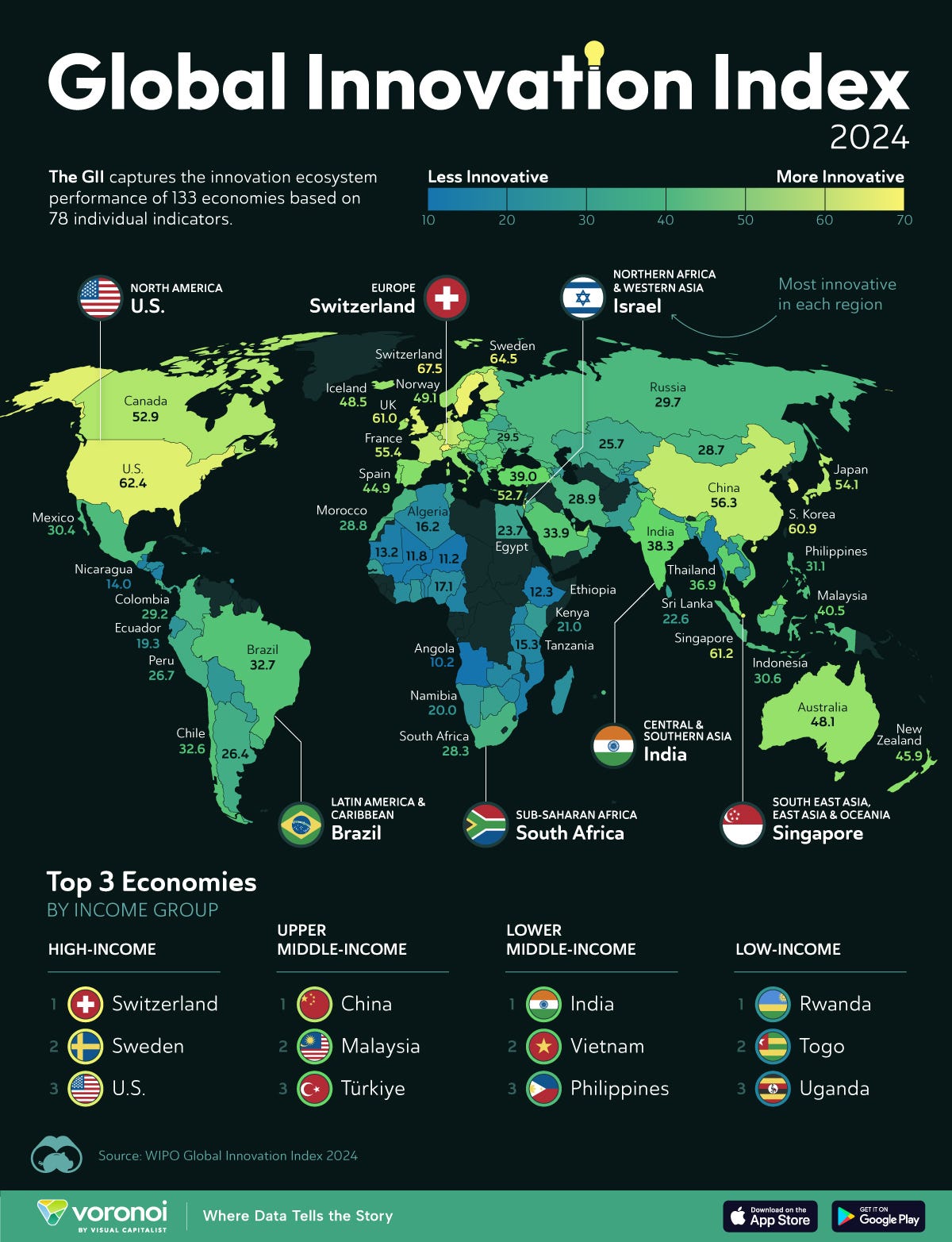The Sunday Brew #134
In this brew - Global Innovation Index 2024 in a picture | Shirky Principle & The Centipede Dilemma | Microsoft quits Pakistan, Soham Parekh fiasco & One Big Beautiful Bill
Welcome to The Sunday Brew, weekly 1-2-3 newsletter by The Percolator. Every Sunday we drop in your inbox 1 story in a picture, 2 concepts, ideas or frameworks to expand your horizons and 3 news from the week, to keep you updated.
If you are not a paid subscriber, here is what you missed last week:
ONE STORY IN A PICTURE
TWO IDEAS, FRAMEWORKS OR CONCEPTS
This week we bring to you two mental models - Shirky Principle & The Centipede Dilemma
Shirky Principle
The Shirky Principle, coined by writer and theorist Clay Shirky, states that institutions tend to preserve the problems to which they are the solution.
Organizations or entities created to solve a particular issue often resist fully resolving it because their existence, relevance, or funding depends on that problem continuing. This creates a paradox where the institution's survival is linked to the persistence of the very problem it is meant to solve.
For example, government agencies addressing social issues like poverty or illiteracy may become more focused on maintaining their budgets and roles rather than effectively eliminating the problem.
Similarly, companies might maintain outdated technologies or systems that generate ongoing revenue instead of adopting better solutions that could make them obsolete. The principle also highlights how institutions may unconsciously or deliberately perpetuate problems, sometimes even exacerbating them, because they benefit from the status quo. This dynamic is driven by factors such as bureaucratic inertia, vested interests, fear of change, and lack of incentives to innovate or solve root causes. It explains why some organizations resist disruptive innovations or reforms that could solve problems but threaten their power or resources.
The Shirky Principle encourages critical scrutiny of whether institutions are genuinely addressing issues or simply sustaining them to justify their existence. It also implies that solutions often arise from outside established institutions, as incumbents have little motivation to fully fix problems that underpin their relevance.
This principle is observed across various domains, including healthcare, bureaucracy, technology, and even education, where the balance between being useful and becoming obsolete leads to a cautious approach to change.
🚀
The Centipede Dilemma
The Centipede Dilemma refers to a psychological phenomenon where consciously thinking about an automatic or well-practiced action can disrupt its smooth execution.
The term comes from a story about a centipede who, when asked how it coordinates its many legs while walking, becomes so self-conscious that it can no longer walk properly. This illustrates how overthinking or consciously monitoring a task that is normally automatic can impair performance.
In everyday life, many actions such as walking, typing, or playing a musical instrument become automatic through practice and are controlled by subconscious processes. When a person starts to focus intensely on the mechanics of these actions, it can interfere with the fluidity and timing, causing awkwardness or errors. This effect is related to the concept of "paralysis by analysis," where excessive conscious control disrupts the natural flow of a skill. It highlights the distinction between implicit and explicit memory systems: implicit memory allows smooth, automatic execution, while explicit attention can sometimes hinder performance.
The Centipede Dilemma is important in fields like sports psychology, rehabilitation, and skill learning, where athletes or learners are taught to trust their trained instincts rather than overthink movements.
Understanding this phenomenon helps explain why sometimes "just doing" feels easier than "thinking about doing," and why trying too hard to control an automatic process can backfire. It underscores the value of practice and muscle memory in mastering complex tasks and the potential pitfalls of conscious interference during performance.
THREE NEWS FROM THE WEEK
Microsoft Ends 25-Year Presence in Pakistan Amid Economic and Strategic Shifts
Global technology giant Microsoft has officially shut down its local operations in Pakistan, marking the end of a 25-year presence in the country since 2000. The company confirmed the closure on July 4, 2025, as part of a broader global restructuring and strategic shift towards a cloud-based, partner-led business model.
The closure affects a small team of five employees in Pakistan, with Microsoft stating that customer agreements and services will continue uninterrupted through certified local partners and nearby regional offices, such as those in Europe and other Asian countries. The company emphasized that this operational change aligns with models successfully implemented in several other markets worldwide.
Former Microsoft Pakistan head Jawwad Rehman publicly confirmed the shutdown, describing it as “more than a corporate exit,” reflecting on Pakistan’s deteriorating economic environment, political instability, and rising business challenges. He highlighted that the worsening investment climate and high taxes contributed to making the market unsustainable for global tech firms like Microsoft.
This exit comes amid Microsoft’s global workforce reduction, which includes cutting approximately 9,000 jobs worldwide as the company pivots towards artificial intelligence and cloud services. Pakistan’s Ministry of IT clarified that the move should not be seen as a full exit but as a shift to a partner-led model consistent with evolving industry standards.
The departure has raised concerns within Pakistan’s tech community and government, with former President Arif Alvi calling it a troubling indicator of the country’s economic challenges and missed opportunities for technological investment. Microsoft’s exit leaves a gap in digital education and business support, potentially slowing growth in Pakistan’s burgeoning tech ecosystem.
Overall, Microsoft’s shutdown in Pakistan underscores the critical need for political stability, economic reforms, and investor-friendly policies to retain global technology leaders in the country.
➖
Trump Celebrates Signing of "Big, Beautiful Bill" with Patriotic Ceremony at White House
On July 4, 2025, President Donald Trump signed the landmark "One Big Beautiful Bill" into law during a festive Independence Day ceremony at the White House. The bill, a centerpiece of Trump’s second-term agenda, extends the 2017 tax cuts permanently, boosts military spending, and allocates substantial funds for border security and immigration enforcement.
The nearly 1,000-page legislation includes $4.5 trillion in tax cuts, $350 billion for border security including the US-Mexico wall, and a $150 billion increase in defense spending. It also enacts significant welfare cuts, including reductions to Medicaid, and introduces new tax incentives for tipped workers and overtime pay.
The signing event featured a dramatic flyover by B-2 stealth bombers and advanced fighter jets, piloted by those involved in recent U.S. strikes on Iranian nuclear facilities. Trump hailed the bill as “the biggest victory yet,” emphasizing that it fulfilled campaign promises and would stimulate economic growth. “America is winning, winning, winning like never before,” he declared to an enthusiastic crowd of supporters, lawmakers, and military families.
The bill passed Congress narrowly, with a 218-214 vote in the House after a marathon debate. It faced opposition from some Republicans concerned about deficits and Democrats who criticized the bill for favoring the wealthy and cutting social programs.
With the "Big, Beautiful Bill" now enacted, it stands as a defining legislative achievement of Trump’s presidency, marking a significant milestone in his administration’s agenda.
➖
Soham Parekh Scandal: Coder Accused of Moonlighting at Multiple US Startups Sparks Silicon Valley Outrage
Soham Parekh, an software engineer, has become the center of a major controversy after being accused of secretly working full-time for up to five US startups simultaneously, deceiving employers about his availability and commitments.
The scandal erupted when Suhail Doshi, founder of Playground AI and former CEO of Mixpanel, publicly accused Parekh on social media of juggling multiple jobs and misleading several Y Combinator-backed startups.
Doshi revealed he had fired Parekh within a week of hiring him due to dishonesty. Following Doshi’s post, several other startup founders came forward sharing similar experiences, describing how Parekh impressed them during interviews but later disappeared, missed meetings, and delayed deliverables while secretly working elsewhere. Dhruv Amin, co-founder of AI startup Create, called the ordeal a costly drain on time and resources but acknowledged Parekh’s technical skills, attributing the problem to repeated lying rather than ability.
Parekh reportedly fabricated parts of his resume, provided false location details, and even used multiple identities to secure jobs. Some companies shipped laptops to US addresses linked to him, only to find discrepancies. Despite the uproar, Parekh reached out privately to Doshi, expressing remorse and seeking career advice, admitting financial hardship as a motive but denying employing others to cover his workload.
The case has ignited a heated debate on the ethics of remote hiring and the thin line between moonlighting and deception. While Parekh’s technical talent is acknowledged, his actions have raised serious concerns about trust and transparency in the startup ecosystem. Parekh has since joined an AI startup, Darwin Studios, signaling a new chapter amid ongoing scrutiny
The Sunday Brew by The Percolator brings to you curated news on tech, business & entrepreneurship, from across the internet to give your week a perfect start.
Share your thoughts and opinions on the topics covered in this newsletter by leaving a comment and joining the conversation.








